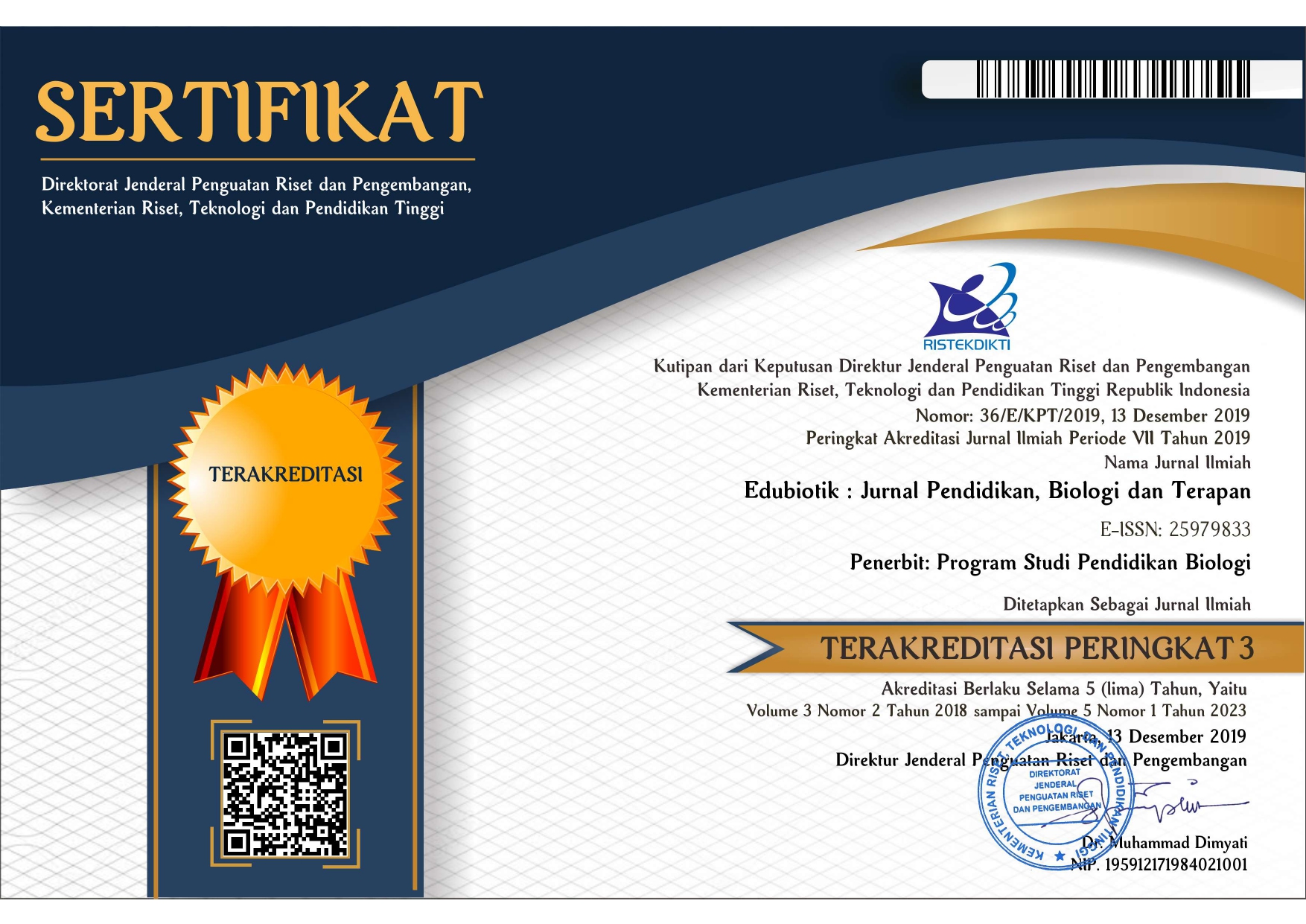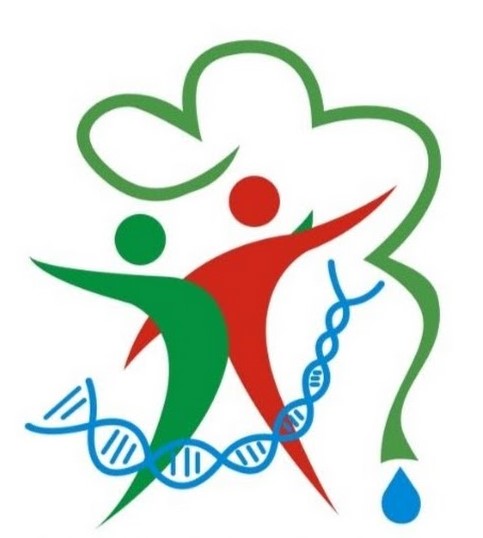Analysis of biology teacher candidates' science process skills in vertebrate zoology courses
Abstract
Science Process Skills (SPS) need to be developed to improve teacher quality in teaching. The existence of the Covid-19 pandemic caused Biology teachers to be unable to carry out practicums so the SPS were helpless. This study aims to analyze the science process skills of biology teacher candidates in vertebrate zoology courses. The research method used is descriptive quantitative through survey techniques. This research was conducted at the PGRI Ronggolawe University and involved 21 participants. This study uses an instrument in the form of an observation sheet to measure scientific process skills. The SPS indicators that are measured are the skills of observing, measuring, compiling tables, and obtaining and processing data. The data obtained is then interpreted into very high, high, low, and very low categories. The percentage of students in each category is then calculated as a map of their science process skills through analysis of quantitative descriptive data. The results showed that 65.5% of prospective biology teachers had SPS scores that were in the very high, high, low, and very low categories. 7.5% has an SPS value which is included in the very low category. In general, biology teacher candidates tend to have very high levels of competency in performing science process skills.
References
Andini, T. E., Hidayat, S., Fadillah, E. N., & Permana, T. I. (2018). Scientific Process Skills: Preliminary Study towards Senior High School Student in Palembang. JPBI (Jurnal Pendidikan Biologi Indonesia), 4(3), 243–250. https://ejournal.umm.ac.id/index.php/jpbi/article/view/6784
Anggraeni, H., Rahayu, S., Rusdi, R., & Ichsan, I. (2018). Pengaruh Pengajaran Timbal Balik dan Pembelajaran berbasis Masalah terhadap Kemampuan Berpikir Kritis Peserta Didik pada Materi Sistem Reproduksi. Biota, 11(1), 77–95. https://biota.ac.id/index.php/jb/article/view/84
Aswan, A. (2020). Implementasi Gerakan Literasi Sekolah di Community Learning Center sebagai Upaya Meningkatkan Kosakata Bahasa Indonesia Siswa. KLITIKA: Jurnal Pendidikan Bahasa Dan Sastra Indonesia, 2(1), 1–10. https://doi.org/10.32585/klitika.v2i1.708
BSNP. (2010). Paradigma Pendidikan Nasional Abad XXI. Departemen Pendidikan Nasional. https://repositori.kemdikbud.go.id/
Darmaji, D., Kurniawan, D. A., Parasdila, H., & Irdianti, I. (2018). Deskripsi Keterampilan Proses Sains Mahasiswa pada Materi Termodinamika. Berkala Ilmiah Pendidikan Fisika, 6(3), 345. https://doi.org/10.20527/bipf.v6i3.5290
Dwianto, A.; Wilujeng, I.; Prasetyo, ZK; & Suryadarma, I. (2017). Pengembangan Perangkat Pembelajaran berbasis Domain Sains yang Terintegrasi dengan Kearifan Lokal untuk Meningkatkan Keterampilan Proses Sains dan Sikap Ilmiah. Jurnal Pendidikan IPA Indonesia, 6(1), 23–31. https://doi.org/10.15294/jpii.v6i1.7205
Erkol, S., & Ugulu, I. (2014). Examining Biology Teachers Candidates’ Scientific Process Skill Levels and Comparing these Levels in Terms of Various Variables. Procedia - Social and Behavioral Sciences, 116, 4742–4747. https://doi.org/10.1016/j.sbspro.2014.01.1019
Fadllan, A. (2016). Strategi Pengembangan Science Generic Skills (SGS) Calon Guru Fisika melalui Model Pembelajaran Group Investigation pada Mata Kuliah Praktikum. Phenomenon : Jurnal Pendidikan MIPA, 1(1), 31–44. https://doi.org/10.21580/phen.2011.1.1.443
Fitriana, F., Kurniawati, Y., & Utami, L. (2019). Analisis Keterampilan Proses Sains Peserta Didik Pada Materi Laju Reaksi Melalui Model Pembelajaran Bounded Inquiry Laboratory. JTK (Jurnal Tadris Kimiya), 4(2), 226–236. https://doi.org/10.15575/jtk.v4i2.5669
Hamdani. (2017). Strategi Belajar Mengajar. Pustaka Setia.
Hamdiyati, Y., & Kusnadi. (2007). Profil Keterampilan Proses Sains Mahasiswa melalui Pembelajaran Berbasis Kerja Ilmiah pada Matakuliah Mikrobiologi. Jurnal Pengajaran MIPA, 9(2), 36–42. https://ejournal.upi.edu/index.php/jpmipa/article/view/35751
Hamia; Muhiddin, P.; Arsal, A. F. (2020). Keterampilan Komunikasi Peserta Didik: Studi Kasus pada Pembelajaran Biologi di SMA Negeri 1 Sidrap. 1-7. http://eprints.unm.ac.id/id/eprint/19226
Handayani, G., Adisyahputra, A., & Indrayanti, R. (2018). Korelasi antara Ilmu Terpadu Keterampilan Proses, dan Kemampuan Membaca Pemahaman hingga Literasi Sains pada Guru Biologi Siswa. Biosfer: Jurnal Pendidikan Biologi, 11(1), 22–32. https://doi.org/10.21009/biosferjpb.11-1.3
Harja, M., & Sinaga, P. (2021). Evaluation of Science Process Skills of High School Students in Tapaktuan City on Static Fluid Material. Journal of Physics: Conference Series, 1806(1). https://doi.org/10.1088/1742-6596/1806/1/012016
Hayati, N., & Ami, M. S. (2022). Students’ Learning Activities and Science Process Skills: The Effectiveness of Group Investigation Learning Model. JPBIO (Jurnal Pendidikan Biologi), 7(1), 51–66. https://doi.org/10.31932/jpbio.v7i1.1519
Ismail, S., Rahman, M. H., & Muhammad, N. (2019). Pengaruh Model Pembelajaran Guided Inquiry terhadap Hasil Belajar Siswa pada Materi Momentum dan Impuls Kelas X Mia 5 SMA Negeri 1 Kota Ternate. Saintifik@ (Jurnal Pendidikan MIPA), 4(2), 31–36. https://ejournal.unkhair.ac.id/index.php/Saintifik/article/view/1392
Kruea-In, N., & Thongperm, O. (2014). Teaching of Science Process Skills in Thai Contexts: Status, Supports and Obstacles. Procedia-Social and Behavioral Sciences, 141, 1324–1329. https://doi.org/10.1016/j.sbspro.2014.05.228
Masahere, U. (2020). Analisis Proses Pembelajaran dalam Jaringan (DARING) dalam Masa Pandemi COVID-19 pada Mahasiswa Studi Kasus Mahasiswa Jurusan Akuntansi Kelas 61.5B.07 Kampus Salemba 22 Universitas Bina Sarana Informatika. Edutech Consultant BandungJurnal Aksara Public, 4(4), 83–94. https://garuda.kemdikbud.go.id/documents/detail/1856935
Özgelen, S. (2012). Students’ Science Process Skills within A Cognitive Domain Framework. Eurasia Journal of Mathematics, Science and Technology Education, 8(4), 283–292. https://doi.org/10.12973/eurasia.2012.846a
Prajoko, S., Amin, M., Rohman, F., & Gipayana, M. (2017). The Usage of Recycle Materials for Science Practicum: Is There Any Effect on Science Process Skills? International Journal of Evaluation and Research in Education (IJERE), 6(1), 1. https://doi.org/10.11591/ijere.v6i1.6340
Prayitno, B. A., Corebima, D., Susilo, H., Zubaidah, S., & Ramli, M. (2017). Closing the science process skills gap between students with high and low level academic achievement. Journal of Baltic Science Education, 16(2), 266–277. https://doi.org/10.33225/jbse/17.16.266
Putri, D. T., Wardhani, S., & Indawan, I. (2022). Analisis Pembelajaran Daring Biologi di Masa Pandemi Covid-19 Prodi Pendidikan Biologi FKIP Universitas Muhammadiyah Palembang. Biodik, 8(1), 1–9. https://doi.org/10.22437/bio.v8i1.14495
Ristanto, R. H., & Djamahar, R. (2019). Penguatan Keterampilan Penilaian Autentik Guru IPA Biologi di Kabupaten Bogor. BAKTIMAS : Jurnal Pengabdian Pada Masyarakat, 1(1), 61. https://www.researchgate.net/
Rustaman, N. Y. (2005). Perkembangan Penelitian Pembelajaran Berbasis Inkuiri dalam Pendidikan Sains. Seminar Nasional II Himpunan Ikatan Sarjana Dan Pemerhati IPA Indonesia, 22–23. http://file.upi.edu/Direktori/FPMIPA/JUR._PEND._BIOLOGI/195012311979032-NURYANI_RUSTAMAN/PenPemInkuiri.pdf
Spektor-Levy, O., Eylon, B. S., & Scherz, Z. (2009). Teaching Scientific Communication Skills in Science Studies: Does It Make A Difference?. International Journal of Science and Mathematics Education, 7(5), 875–903. https://doi.org/10.1007/s10763-009-9150-6
Sujarwanto, E., & Putra, I. A. (2018). Investigasi Keterampilan Proses Sains Terintegrasi Mahasiswa Pendidikan Fisika Universitas KH. A. Wahab Hasbullah. Momentum: Physics Education Journal, 2(2), 79–85. https://doi.org/10.21067/mpej.v2i2.2726
Sukarno; Permanasari, A., & & Hamidah, I. (2013). The Profile of Science Process Skill (SPS) Student at Secondary High School ( Case Study in Jambi ). International Journal of Scientific Engineering and Research (IJSER), 1(1), 79–83. https://www.ijser.in/archives/v1i1/MDExMzA5MTg=.pdf
Susanti, R., Anwar, Y., & Ermayanti, E. (2018). Profile of Science Process Skills of Preservice Biology Teacher in General Biology Course. Journal of Physics: Conference Series, 1006(1). https://doi.org/10.1088/1742-6596/1006/1/012003
Tanfiziyah, R., Akbar, B., & Anugrah, D. (2021). Development Instrument Science Process Skills Biology for Junior High School. Edubiotik: Jurnal Pendidikan, Biologi Dan Terapan, 6(01), 58–65. https://doi.org/10.33503/ebio.v6i01.884
Tosun, C. (2019). Scientific Process Skills Test Development within The Topic “Matter And Its Nature” and The Predictive Effect of Different Variables on 7th and 8th Grade Students’ Scientific Process Skill Levels. Chemistry Education Research and Practice, 20(1), 160–174. https://doi.org/10.1039/C8RP00071A
Wilsa, Asrizal W., Susilowati, Sri Mulyani E., & Rahayu, Enni S. (2017). Problem Based Learning Berbasis Socio-Scientific Issue untuk Mengembangkan Kemampuan Berpikir Kritis dan Komunikasi Siswa. Journal of Innovative Science Education, 6(1), 129–137. https://journal.unnes.ac.id/sju/index.php/jise/article/view/17072
Zeidan, A. H., & Jayosi, M. R. (2014). Science Process Skills and Attitudes toward Science among Palestinian Secondary School Students. World Journal of Education, 5(1), 13–24. https://doi.org/10.5430/wje.v5n1p13





.png)
2.png)

1.jpg)


